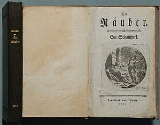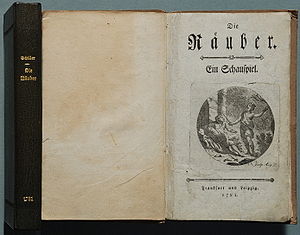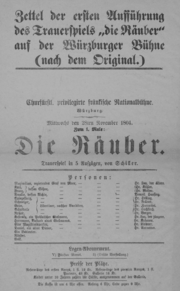
Die Räuber
Encyclopedia

Drama
Drama is the specific mode of fiction represented in performance. The term comes from a Greek word meaning "action" , which is derived from "to do","to act" . The enactment of drama in theatre, performed by actors on a stage before an audience, presupposes collaborative modes of production and a...
by German playwright Friedrich Schiller
Friedrich Schiller
Johann Christoph Friedrich von Schiller was a German poet, philosopher, historian, and playwright. During the last seventeen years of his life , Schiller struck up a productive, if complicated, friendship with already famous and influential Johann Wolfgang von Goethe...
. The play was published in 1781
1781 in literature
-Events:* Friedrich Schiller arrested after the first performance of his play, The Robbers-New books:* Anna Barbauld - Hymns in Prose for Children* Robert Bage - Mount Henneth* Christoph Friedrich Bretzner - Belmont und Constanze...
and premiere
Premiere
A premiere is generally "a first performance". This can refer to plays, films, television programs, operas, symphonies, ballets and so on. Premieres for theatrical, musical and other cultural presentations can become extravagant affairs, attracting large numbers of socialites and much media...
d on January 13, 1782 in Mannheim
Mannheim
Mannheim is a city in southwestern Germany. With about 315,000 inhabitants, Mannheim is the second-largest city in the Bundesland of Baden-Württemberg, following the capital city of Stuttgart....
, Germany. It was written towards the end of the German Sturm und Drang
Sturm und Drang
Sturm und Drang is a proto-Romantic movement in German literature and music taking place from the late 1760s through the early 1780s, in which individual subjectivity and, in particular, extremes of emotion were given free expression in reaction to the perceived constraints of rationalism...
("Storm and Stress") movement and has been considered by many critics, such as Peter Brooks
Peter Brooks
Peter Brooks is Sterling Professor Emeritus of Comparative Literature at Yale University and Andrew W. Mellon Scholar in the department of Comparative Literature and the Center for Human Values at Princeton University. He is formerly Professor in the Department of English and School of Law at the...
, to have influenced the development of European melodrama
Melodrama
The term melodrama refers to a dramatic work that exaggerates plot and characters in order to appeal to the emotions. It may also refer to the genre which includes such works, or to language, behavior, or events which resemble them...
. The play astounded its Mannheim audience and made Schiller an overnight sensation. It later became the basis for Verdi
Giuseppe Verdi
Giuseppe Fortunino Francesco Verdi was an Italian Romantic composer, mainly of opera. He was one of the most influential composers of the 19th century...
's opera
Opera
Opera is an art form in which singers and musicians perform a dramatic work combining text and musical score, usually in a theatrical setting. Opera incorporates many of the elements of spoken theatre, such as acting, scenery, and costumes and sometimes includes dance...
of the same name, I masnadieri
I masnadieri
I masnadieri is an opera in four acts by Giuseppe Verdi to an Italian libretto by Andrea Maffei, based on Die Räuber by Friedrich von Schiller....
.
The plot revolves around the conflict
Conflict (narrative)
In literature, Conflict is the inherent incompatibility between the objectives of two or more characters or forces. By its nature, conflict is unstable. One side must always win out in the end...
between two aristocratic brothers, Karl and Franz Moor. The charismatic but rebellious student Karl is deeply loved by his father. The younger brother, Franz, who appears as a cold, calculating villain, plots to wrest away Karl's inheritance. As the play unfolds, both Franz's motives and Karl's innocence and heroism are revealed to be complex.
Schiller's highly emotional language and his depiction of physical violence mark the play as a quintessential Sturm und Drang
Sturm und Drang
Sturm und Drang is a proto-Romantic movement in German literature and music taking place from the late 1760s through the early 1780s, in which individual subjectivity and, in particular, extremes of emotion were given free expression in reaction to the perceived constraints of rationalism...
work. At the same time, the play utilizes a traditional five act structure, with each act containing two to five scenes. The play uses alternating scenes to pit the brothers against each other, as one quests for money and power, while the other attempts to create a revolutionary anarchy in the Bohemian Forest
Bohemian Forest
The Bohemian Forest, also known in Czech as Šumava , is a low mountain range in Central Europe. Geographically, the mountains extend from South Bohemia in the Czech Republic to Austria and Bavaria in Germany...
. Schiller raises many disturbing issues in the play. For instance, he questions the dividing lines between personal liberty and the law and probes the psychology of power, the nature of masculinity and the essential differences between good and evil. He strongly criticizes both the hypocrisies of class and religion and the economic inequities of German society. He also conducts a complicated inquiry into the nature of evil.
Dramatis personae

- Maximilian, Count von Moor (also called "Old Moor") is the beloved father of Karl and Franz. He is a good person at heart, but also weak, and has failed to raise his two sons properly. He bears responsibility for the perversion of the Moor family, which has caused the family's values to become invalidated. The Moor family acts as an analogy of stateSovereign stateA sovereign state, or simply, state, is a state with a defined territory on which it exercises internal and external sovereignty, a permanent population, a government, and the capacity to enter into relations with other sovereign states. It is also normally understood to be a state which is neither...
, a typical political criticism of Schiller's. The prince as a father of the nation is particularly condemned.
- Karl (Charles) Moor, his older son, is a self-confident idealist. He is good-looking and well liked by all. He holds feelings of deep love for Amalia and a general spirit of melancholy about the promising life he has left behind for a life of lawlessness. Together with his gang of robbers, he fights against the unfairness and corruption of the feudal authorities. After his father, misled by brother Franz, curses Karl and banishes him from his home, Karl becomes a more disgraceful criminal and murderous arsonist. This despair leads to the urge to express and discover new goals and directions, and to realize his ideals and dreams of heroism. He breaks the law, for as he says, "the end justifies the means." He develops a close connection with his robbers, especially to Roller and Schweizer, but recognizes the unscrupulousness and dishonor of Spiegelberg and his other associates. Amalia creates a deep internal twist in the plot and in Karl's persona. He swore allegiance to the robbers after Schweizer and Roller died for his sake, and he promised that he would never separate from his men, so cannot return to Amalia. In deep desperation due to the death of his father, he eventually kills his true love and decides to turn himself in to the law.
- Franz Moor, his younger son, is an egoistic rationalist and materialist. He is cold-hearted and callous. He is rather ugly and unpopular, as opposed to his brother Karl, but quite intelligent and cunning. However, since his father loved only his brother and not him, he developed a lack of feeling, which made the "sinful world" intolerable for his passions, and he consequently fixed himself to a rationalistic way of thinking. In the character of Franz, Schiller demonstrates what could happen if the moral way of thinking was replaced by the pure rationalization. Franz strives for power in order to be able to implement his interests.
- Amalia von Edelreich, his niece is Karl's love and is a faithful and reliable person (to learn more of their relationship see "Hektorlied" (de)).
- Spiegelberg acts as an opponent of Karl Moor and is driven by crime. Additionally, he self-nominated himself to be captain in Karl's robber band, yet was passed up in favor of Karl. Spiegelberg tries to portray Karl negatively among the robbers in order to become the captain, but does not succeed.
- Schweizer
- Grimm
- Razmann
- Schufterle
- Roller
- Kosinsky
- Schwarz
- Herrmann, the illegitimate son of a Nobleman.
- Daniel, an old servant of Count von Moor.
- Pastor Moser
- Pater
- A Monk.
- Band of robbers, servants, etc.
The play is referred to in Dostoyevsky's The Brothers Karamazov
The Brothers Karamazov
The Brothers Karamazov is the final novel by the Russian author Fyodor Dostoyevsky. Dostoyevsky spent nearly two years writing The Brothers Karamazov, which was published as a serial in The Russian Messenger and completed in November 1880...
. Fydor Karamazov compares himself to Count von Moor, whilst comparing his eldest son, Dmitri, to Franz Moor, and Ivan Karamazov to Karl Moor.
English translations
Peter NewmarkPeter Newmark
Peter Newmark , was an English professor of translation at the University of Surrey.-Biography:He was one of the main figures in the founding of Translation Studies in the English-speaking world from the 1980s...
notes three translations in the Encyclopedia of Literary Translation: Public domain; widely available in many formats. The same translation apparently also appears in
Klaus van den Berg has compared the later two translations, "The two most prominent translations from the latter part of the twentieth century take very different approaches to this style: F.J. Lamport’s 1979 translation, published in the Penguin edition, follows Schiller’s first epic-sized version and remains close to the original language, observing sentence structures, finding literal translations that emphasize the melodramatic aspect of Schiller’s work. In contrast, Robert MacDonald’s 1995 translation, written for a performance by the Citizen’s Company at the Edinburgh Festival, includes some of Schiller’s own revisions, modernizes the language trying to find equivalences to reach his British target audiences. While Lamport directs his translation toward an audience expecting classics as authentic as possible modeled on the original, McDonald opts for a performance translation cutting the text and interpreting many of the emotional moments that are left less clear in a more literal translation."
Michael Billington
Michael Billington (critic)
Michael Keith Billington is a British author and arts critic. Drama critic of The Guardian since October 1971, he is "Britain's longest-serving theatre critic" and the author of biographical and critical studies relating to British theatre and the arts; most notably, he is the authorised...
wrote in 2005 that Robert MacDonald "did more than anyone to rescue Schiller from British neglect."
Unpublished translations
- Millar, Daniel and Leipacher, Mark (2010). The Robbers. Presented by the Faction Theatre CompanyThe Faction Theatre CompanyThe Faction Theatre Company is an independent touring theatre company based in London. It specialises in producing revivals of classical texts using a "physical and inventive approach". The company's plays are usually presented with no props or set....
.
Adaptations
- I masnadieriI masnadieriI masnadieri is an opera in four acts by Giuseppe Verdi to an Italian libretto by Andrea Maffei, based on Die Räuber by Friedrich von Schiller....
(1847), opera by Giuseppe VerdiGiuseppe VerdiGiuseppe Fortunino Francesco Verdi was an Italian Romantic composer, mainly of opera. He was one of the most influential composers of the 19th century...
, film directed by J. Searle DawleyJ. Searle DawleyJ. Searle Dawley was an American director and screenwriter. He directed 149 films between 1907 and 1926. He was born in Del Norte, Colorado and died in Hollywood, California.-Selected filmography:...
and Walter Edwin - Die RäuberDie Räuber (opera)Die Räuber, op.25, is an opera in four acts by Giselher Klebe who also wrote the libretto based on the play by Friedrich Schiller....
(1957), opera by Giselher KlebeGiselher KlebeGiselher Wolfgang Klebe was a German composer. He composed more than 140 works, among them 14 operas, 8 symphonies, 15 solo concerts, chamber music, piano works, and sacred music.-Biography:...

